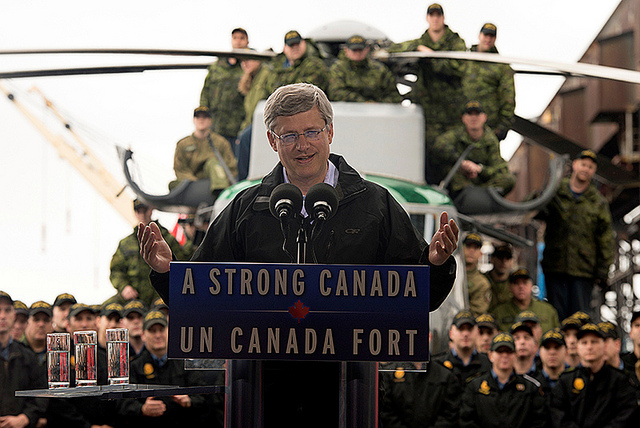With Ottawa’s deficit about to turn into a surplus, we’ll soon be able to loosen our belts a bit and fulfill our pent-up dream of splurging on new tanks and fighter planes.
Some Canadians have other priorities, of course — investing in public health care usually tops the list in polls — but Stephen Harper’s government has already ruled that out.
Here’s what Harper is actually planning to do: boost military funding and deeply cut spending on health care. None of this is secret — although you wouldn’t necessarily pick it up from the media.
For instance, given last week’s busy news cycle — what with the discovery of a ship that sank 170 years ago, the prospect of a second royal baby and the introduction of a new iPhone — it was easy to miss a Harper spokesman saying that it is “important to continue increasing our defence spending.”
Knowing that’s not what most Canadians want to do with the surplus, Harper declined to commit to NATO’s request for members to raise defence spending to two per cent of GDP — which would mean doubling Canada’s military budget from $19 billion to a stunning $38 billion a year.
But if he makes it through the next election, Harper, who has shown a keenness to rev up Cold War tensions, is likely to use the NATO call as an excuse to resume his long-term plan, quietly launched in 2008, to dramatically ramp up Canada’s military spending.
While Harper has always been a free-spending war hawk, he’s been tight-fisted when it comes to spending on something many Canadians consider far more important: public health care.
Medicare, with its principles of equality and accessibility regardless of income, represents values that are the very antithesis of the marketplace but that apparently resonate with Canadians. As the Romanow commission on health care noted: “Canadians view medicare as a moral enterprise, not a business venture.”
But this clearly puts medicare at odds with Harper’s fierce anti-tax, pro-market views — views that led him to serve for four years as president of the National Citizens Coalition, the far-right advocacy group started in the 1960s by a militant opponent of public health insurance. In a 1997 speech to a right-wing U.S. organization, Harper showed his contempt for Canadian social programs — and the pride Canadians take in them — when he dismissed Canada as “a Northern European welfare state in the worst sense of the term, and very proud of it.”
As prime minister he’s been more careful, keen to avoid getting branded as a supporter of two-tier medicine — a label that helped cut short the electoral ambitions of Stockwell Day, his predecessor as head of the Canadian Alliance.
Instead, Harper has paid lip service to public health care — while starving it of funds.
Waiting until he’d secured his majority, he announced plans in December 2011 that would effectively cut in half the rate of growth of federal health transfers to the provinces, starting in 2017 — amounting to an estimated cut of $36 billion over 10 years.
The cuts — along the lines long advocated by the right — will dramatically shrink public funding for health care over time, forcing Canadians to pay more of their health-care costs privately, on the grounds that the public system is unaffordable.
In fact, the record shows the opposite. As UBC health economist Robert Evans put it: “Opponents of medicare claim that public health care is ‘fiscally unsustainable’ and that the only viable solution is a shift to more private coverage. Bluntly, this is a lie.”
Indeed, contrary to popular belief, the amount spent on public health care in Canada has remained stable at about four to five per cent of GDP since the mid-1970s.
What is out of control is private spending on health care, notably prescription drugs, which has pushed overall health spending in Canada to about 11 per cent of GDP.
Canadians currently pay about 30 per cent more for brand-name drugs than the international average, and this will get worse under the upcoming Canada-EU free trade deal, which is expected to cost Canadians up to $1.6 billion more a year in drug costs.
On the other hand, a universal public drug plan could save us $11.4 billion a year, according to the Canadian Health Coalition. Clearly, such a wise, public-spirited plan would be viewed as an abomination by the drug industry and the former head of the National Citizens Coalition.
As for the public, a recent Nanos poll found that eight in 10 Canadians oppose changes that would reduce funding for public health care over time — a plan that Harper has already laid out.
But with the media easily diverted onto the play-by-play of finding old sunken ships, how will the public know that, instead of ensuring the future of Canada’s “moral enterprise,” Harper intends to spend our money on expensive new tools for making war.
Winner of a National Newspaper Award, Linda McQuaig has been a reporter for the Globe and Mail, a columnist for the National Post and the Toronto Star and author of seven bestsellers, including Shooting the Hippo: Death by Deficit and other Canadian Myths and It’s the Crude, Dude: War, Big Oil and the Fight for the Planet. Her most recent book (co-written with Neil Brooks) is The Trouble with Billionaires: How the Super-Rich Hijacked the World, and How We Can Take It Back.
This article is reprinted with permission from iPolitics ![]()
Photo: pmwebphotos/flickr



